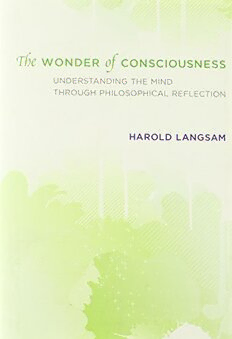
The wonder of consciousness : understanding the mind through philosophical reflection PDF
Preview The wonder of consciousness : understanding the mind through philosophical reflection
The Wonder of Consciousness The Wonder of Consciousness: Understanding the Mind through Philosophical Reflection Harold Langsam The MIT Press Cambridge, Massachusetts London, England © 2011 Massachusetts Institute of Technology All rights reserved. No part of this book may be reproduced in any form by any electronic or mechanical means (including photocopying, re- cording, or information storage and retrieval) without permission in writing from the publisher. For information about special quantity discounts, please e-mail special_ [email protected] W. D. Snodgrass, excerpt from “April Inventory” from Not for Specialists: New and Selected Poems. Copyright © 1959, 2003 by W. D. Snodgrass. Re- printed with the permission of BOA Editions, Ltd., www.boaeditions.org. This book was set in Stone Sans and Stone Serif by the MIT Press. Printed and bound in the United States of America. Library of Congress Cataloging-in-Publication Data Langsam, Harold L., 1961–. The wonder of consciousness : understanding the mind through philo- sophical reflection / Harold Langsam. p. cm. Includes bibliographical references (p. ) and index. ISBN 978-0-262-01585-1 (hardcover : alk. paper) 1. Consciousness. I. Title. B808.9.L36 2011 126—dc22 2010045903 10 9 8 7 6 5 4 3 2 1 To Marcia Though trees turn bare, and girls turn wives, We shall afford our costly seasons; There is a gentleness survives That will outspeak and has its reasons. There is a loveliness exists, Preserves us, not for specialists. —W. D. Snodgrass Contents Preface ix 1 Introduction 1 1.1 Wonder and Intelligibility 1 1.2 Intelligibility and Philosophy 5 1.3 The Distraction of (Reductive) Physicalism 10 1.4 How to Ignore Physicalism 16 1.5 The Intelligibility of Consciousness: A First Step 24 2 The Intelligibility of Consciousness I: How Experience Relates Us to the World 29 2.1 The Intrinsic Nature of Experience 29 2.2 The Intelligible Relations between Observable Properties and Phenomenal Properties 38 2.3 How Observable Properties Intelligibly Explain Phenomenal Properties 53 2.4 How Observable Properties Are Intelligibly Similar to Phenomenal Properties 61 2.5 How Consciousness Reveals the External World to Us: A First Step 65 3 The Intelligibility of Consciousness II: The Causal Powers of Conscious States 71 viii Contents 3.1 The Idea of Intelligible Causation 71 3.2 Motivating the Idea of Intelligible Causation 75 3.3 The Intelligible Causal Powers of Experiences 85 3.4 The Intelligible Causal Powers of Beliefs: Inference 99 3.5 The Intelligible Causal Powers of Rational Intuitions: Reflection 103 3.6 Intelligible Causation and Introspection 106 4 The Importance of Consciousness I: Belief, Rationality, and Knowledge 111 4.1 Consciousness and Rationality 111 4.2 Rationality and Reasoning 116 4.3 Some Applications of the Theory of Rationality 118 4.4 Two Kinds of Rationality 122 4.5 Justification, Rationality, and Intelligible Causation 129 4.6 The Unity of Knowledge 135 5 The Importance of Consciousness II: Desire, Feeling, and Value 141 5.1 Desire, Rational Desire, and Value 141 5.2 Two Kinds of Rational Desires 147 5.3 Bodily Sensations: Pleasures and Pains 156 5.4 Feelings 166 5.5 Ideal Desires: Consciousness and Value 179 6 The Wonder of Consciousness: Conclusions 185 Notes 189 References 215 Index 227 Preface I am privileged to be a philosopher; I get to sit in my study and think about the world in an attempt to gain knowledge of it. Of course there are many things about the world that you can discover only by going out and investigating it. But we philoso- phers tend to think that some of the most interesting features of the world are available for discovery merely by staying at home and engaging in careful reflection. This book is my mod- est attempt to describe what I believe I have discovered about the mind by staying home. Thanks so much to Brie Gertler for discussion and detailed comments on the first three chapters. Thanks so much to Dan Moseley for detailed comments on the entire manuscript. Thanks for support from the University of Virginia, which allowed me to take paid leave during the spring 2005 semester and begin writing this manuscript. Thanks to my teachers at the Yeshivah of Flatbush for encour- aging independent thought. Thanks especially to my ninth- grade English teacher Rhona Bar-Chama for teaching me how to write. Thanks to all my philosophy professors at Princeton Univer- sity, but thanks especially to my dissertation advisers Gil Harman
